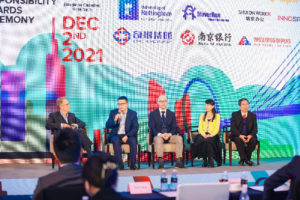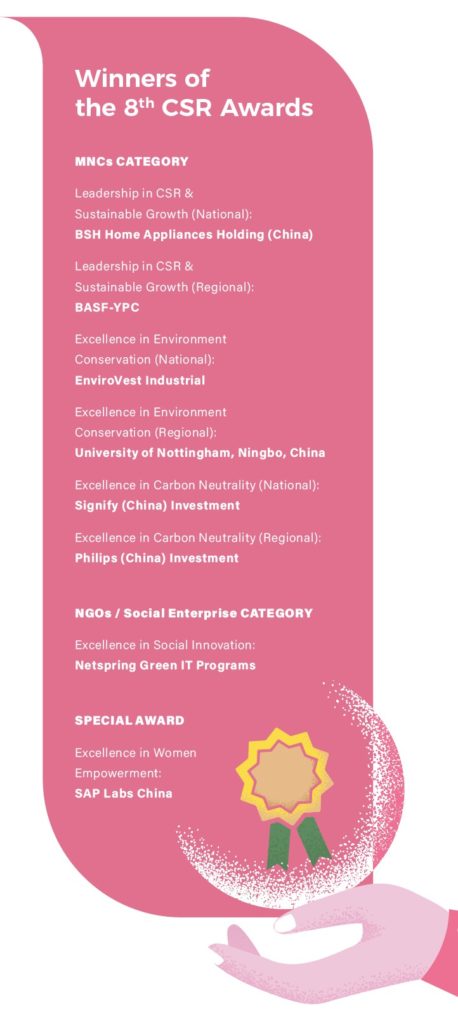
On 2nd December 2021, the European Chamber hosted its 8th Corporate Social Responsibility (CSR) Awards and Forum in Nanjing. The event provided participants the opportunity to share viewpoints and case studies on the exercise of CSR.
Amidst lockdowns and re-openings worldwide, the COVID-19 pandemic has been challenging companies, and shuffling their priorities and initiatives when it comes to CSR. While dealing with the consequences of the pandemic has been the main area of focus, several other topics have also proven to be of great importance over the same period. Chia-Lin Coispeau of Maverlinn Impact Innovation and Katell Le Goulven, of the INSEAD Hoffmann Global Institute for Business and Society, in collaboration with Yijun Wu from the Swiss Embassy in Beijing, bring us the latest developments in climate change and carbon neutrality during the pandemic.
Global business looks very different today than it did just a few years ago. The pandemic has been a major factor in this shift, but it is just one of a number of risks to emerge. As CEOs are expected to engage with societal challenges and take action, many business leaders have responded by integrating CSR actions into their business plans.
This is in line with the latest thinking from leading global business school INSEAD, and its Dean Ilian Mihov, who says business should be on the lookout for new socioeconomic risks as recovery from the pandemic slows and instability mounts. Inequality is also rising along with distrust in key institutions and calls for businesses to be held accountable for their role in society. These emerging risks, Dean Mihov says, are reasons to act.[1]
In China, one issue that has remained high on companies’ agendas in recent years is diversity and inclusion. Numerous studies reveal that vulnerable segments of the population, such as women or part-time workers, took a harder hit from the pandemic. Access to digitalisation, especially for children and rural areas, also remains important amid the ‘fourth industrial revolution’. In the environment area, biodiversity and ocean protection are key, and have been given special focus in China in particular, due to the fact the country hosted the COP15 UN Biodiversity Conference in Kunming in 2021.

Another top concerns is climate change. The path to carbon neutrality remains of upmost importance, and requires strong commitment and solid actions from corporations. In 2015, the Paris Agreement set out a global framework in an attempt to prevent dangerous climate change impacts. Many individual European Union (EU) Member States have announced specific timelines to achieve ‘net zero’ under this framework. The EU’s objective of achieving climate neutrality by 2050 is at the heart of the European Green Deal, and in line with its belief that transitioning to a climate-neutral economy is both an urgent societal challenge and an opportunity to innovate for a better future for all.
Chinese President Xi Jinping made a significant pledge at the UN General Assembly in 2020 that China would become carbon neutral by 2060. Coupled with China’s earlier commitment to peak carbon emissions by 2030, the ‘30/60’ goal has become a driving force for the Chinese Government and companies alike. In October 2021, China released a key climate-related policy document; the Action Plan for Reaching Carbon Dioxide Peak Before 2030. The action plan focusses on areas such as reducing coal consumption, transitioning to renewable energy, reaching carbon peak in the most polluting industries—such as steel and construction—switching to green mobility and developing the circular economy.
Transitioning to a green economy comes with a cost. According to the International Energy Agency (IEA), achieving net-zero carbon emissions by 2070—which the Paris Agreement has deemed necessary to keep global temperatures under the agreed 2°C (degrees Celsius) limit—will require euro (EUR) 31 trillion additional investments above commitments already made by all countries.[2] Separately, the International Renewable Energy Agency (IRENA) estimates that investment in transforming the energy system needs to increase by EUR 117 trillion above the current plans.[3]

This does not mean that tackling climate issues is unprofitable for corporations. Many are already changing their business models to put sustainability at the heart of their operations and services. In this way, CSR becomes an effective tool for mitigating climate change. This can be achieved through actions such as research and development, design, environment-friendly manufacturing techniques, or adopting a green, transparent policy and environmental disclosure system. Global sustainable investment now totals EUR 31.5 trillion,[4] with investors increasingly being driven by environmental, social and governance (ESG)-related factors that have traditionally been excluded from a company’s balance sheet.
When companies focus on ESG issues, it has a long-term impact on their financial success. Adopting sustainable innovation solutions can reduce operating costs substantially, while failure to tackle climate issues, on the other hand, may cost much more in the long run. Since 2000, according to the Energy Transitions Commissions, global warming has cost the United States and the European Union at least EUR 3.5 trillion each in lost output.[5] In addition, the increase of climate-focussed regulations around the world will eventually affect markets and change business models. For example, in Europe, large public-interest companies with more than 500 employees must now disclose information on the social and environmental impact of their activities.
The UN Climate Change Conference 2021, or COP26, took place in Glasgow in November 2021. In his speech to the assembly, with nearly 200 countries in attendance, UN Secretary General Antonio Guterres stated that while the Glasgow Climate Pact was an important step, it was not enough – climate action needs to be accelerated. He said the actions governments, companies and individuals take in the next decade will be crucial.
Many European companies and institutions are already stepping up efforts to align their core businesses with the call for a green future. Governments have sent a strong signal both at home and in the international arena and business education is preparing leaders to seize opportunities in the race to net zero. During COP26, the Business Schools for Climate Leadership[6] initiative brought together eight of Europe’s top management education institutions to discuss ideas and innovations that lead to net zero emissions and truly sustainable development.

One central lesson learned from the health crisis of the past two years is the need to work together to achieve change on a global scale. China’s green economy transition will for sure open new doors for international companies operating in the local market. Its 30/60 goal remains challenging, but can be viewed as an opportunity; innovation and cooperation between European companies and China’s government, cities and organisations can lay the foundation for a sustainable and prosperous, zero-emission global economy.
Acknowledgements
Finally, we would like to take this opportunity to thank the European Chamber, the judges, the winners and all applicants, and the speakers of the 8th CSR awards for providing such an enriching discussion platform.
NOTE: The Chamber gratefully acknowledges the support of the sponsors of our CSR event: BASF-YCP, Arkema, University of Nottingham, Ningbo, Epiroc, Shui On Work & Innospace and Maverlinn.
Chia-Lin Coispeau, partner at Maverlinn Impact Innovation, an advisory firm which aims at reducing social and environmental issues in China and Europe. Our team craft innovative strategies to deliver superior value to industry leaders. Maverlinn is committed to promote a model of humane development through constant attention given to personal empowerment and the common good.
[1] Ilian Mihov, Katell Le Goulven and Mark Stabile, Six global trends in business and society, The Edge Malaysia, 26 February 2022 <https://www.theedgemarkets.com/article/my-say-six-global-trends-business-and-society>
[2] Energy Technology Perspectives 2020, IEA, 2020, viewed 25th February 2022, <https://www.iea.org/reports/energy-technology-perspectives-2020>
[3] Dr Patrick Schröder and Jan Raes, Financing an inclusive circular economy, Chatham House, 19 July 2021, viewed 25th February 2022, <https://www.chathamhouse.org/2021/07/financing-inclusive-circular-economy/02-sdgs-and-how-circular-economy-finance-can-0>
[4] Dominique Blanc and Ashnika Goyal, Latest edition of the Global Sustainable Investment Review confirms strong growth of ESG assets all over the world, Natixis, 29th July 2021, viewed 25th February 2022, <https://gsh.cib.natixis.com/our-center-of-expertise/articles/latest-edition-of-the-global-sustainable-investment-review-confirms-strong-growth-of-esg-assets-all-over-the-world>
[5] Ziady, Hanna, Getting to net zero emissions could cost $2 trillion a year, report says, CNN Business, 16th September 2020, viewed 24th February 2022, <https://edition.cnn.com/2020/09/16/business/net-zero-climate-energy-transitions-commission/index.html>
[6] Business Schools for Climate Leadership Toolkit <https://sites.google.com/view/bs4cl/toolkit?authuser=0>


Recent Comments